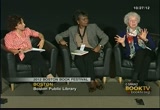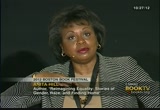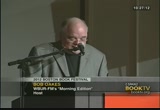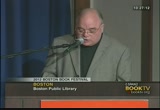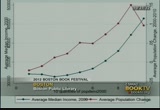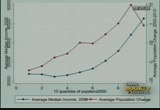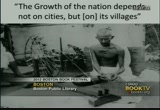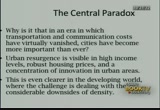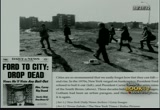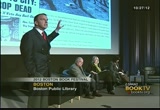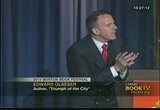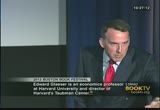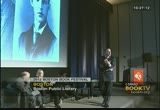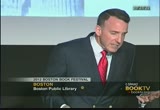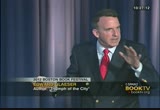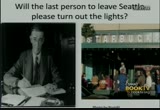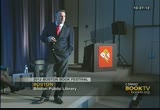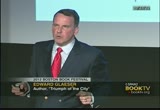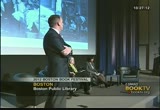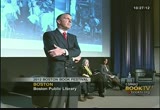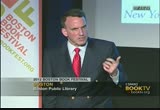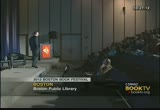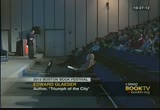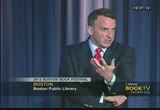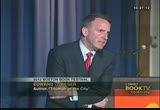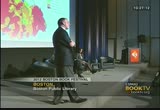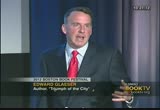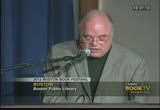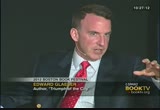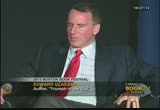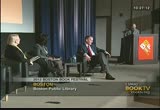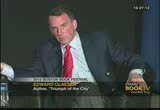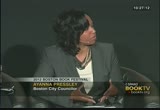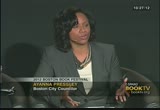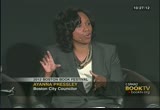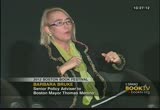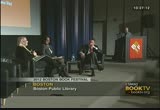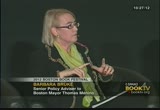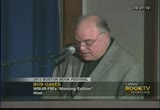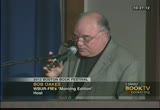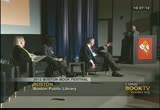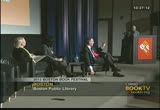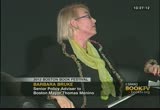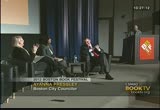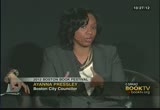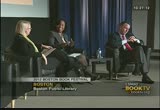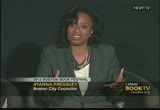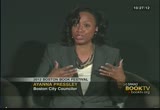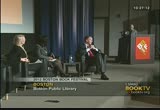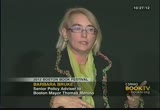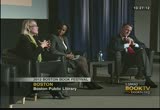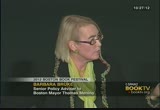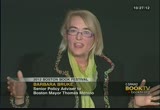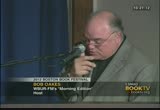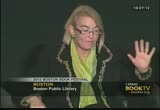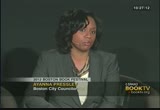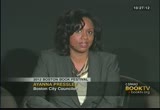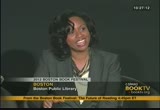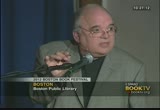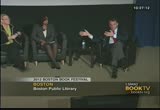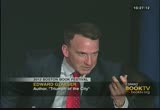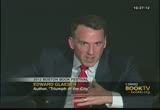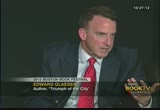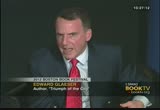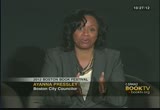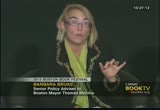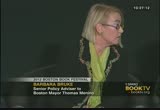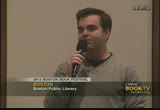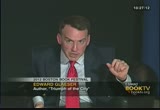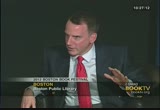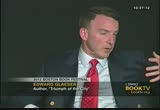tv Book TV CSPAN November 24, 2012 3:30pm-4:45pm EST
3:30 pm
>> that is a great point. [applause] let me just say that as a single woman, you may have an aging grandmother. you may have a very close friend. you may have a medical emergency. so a policy like paid maternity and family leave would be of great help to you. you are at one stage of life. you eventually get older and things may change for you. but we should be sensitive. it really affects everybody. this is not just for married women. it is not for mothers and fathers. this is a fair and equal society where we don't have to trade off, taking care of the ones that we love were getting a paycheck. >> is a single woman with no children, i feel that we find the need to fill the hole. a place where i can be secure, and also began to feel like i
3:31 pm
belong to a community. i agree with you that often, the conversation is about people with children and my definition does not assume that we will all have children two my first two chapters, i think the world has changed drastically for women before they get married. it is before you run into the reality of it that we were talking about. i think it is remarkable what has happened in the life of a single woman in so many different ways, culturally in terms of workplace opportunities and self conception and identity, it has been radically transformed almost more than any other state in the last 30 years. >> on that note, even though we have become the conversation today. i would like to thank janet
3:32 pm
rosen and meghna chakrabarti for joining us. >> tell us what you think about programming this weekend. you can tweet us at booktv. comment on our facebook wall, or send us an e-mail. booktv, nonfiction books every weekend on c-span2. from the fourth annual book festival, the triumph of the city featuring edward glaeser. his book is "the triumph of the city: how our greatest invention makes us richer, smarter, greener, healthier and happier." >> thank you for coming to the auditorium today. this is brought to you by wbur new station. thank you. thank you. i am sure some of you are saying, wow, that is bob oakes? [laughter] i thought he was taller. i thought he was thinner. i thought he had more hair.
3:33 pm
[laughter] you know, the funny thing is that all those things were true last week. let me thank all of you for coming here this afternoon and think the book festival for having us. don't they do a nice job? isn't this a terrific event? [applause] >> that is also part of the plymouth rock foundation for sponsoring this session and without their generosity, it would be hard to put on an event like this that add to the cultural life that we all enjoyed in this great city. so thank you to them. [applause] in the way, that is what we are here to talk about this afternoon. the triumph of the city. the triumph of the city, that is the title of edward glaeser's book, "the triumph of the city: how our greatest invention makes
3:34 pm
us richer, smarter, greener, healthier and happier", about what has made the city's great, the challenges that have been overcome and challenges that are still faced. we'll talk about that in a few minutes in this context of the city with our panel and we will take questions from you as well later. the first, with the presentation, here is the author. professor edward glaeser. [applause] >> thank you. thank you all so much for being here. i am so enormously flattered that you decided to take time out of your afternoon to come and talk about this. i am particularly grateful to the book festival for including us. like every single one of you, i love books and i am thrilled to be part of this. well, let me start with a portrait of america. i call it a portrait to make it clear from the start that i have absolutely no aesthetic sense whatsoever. but this is a sort of a portrait. i have split these things into 10 things, on the basis of
3:35 pm
density levels. at the heart, cities by the absence of physical space between people. cities have proximity, density, closeness. the bottom line shows the relationship between density and income. as you can see, they earn on average on a per capita basis, 50% more than those living in the least dense half of america's county. this is a common phenomenon throughout the world. the three largest metropolitan areas in this country produce 18% of our nation's gdp. almost a fifth. while including only 13% of america's population. the topline shows something that may be more surprising. it is the relationship between population growth between the year 2000 and 2010 an initial population density. as you can see, population
3:36 pm
growth goes up at the start of the 19th century. we were leaving our enclaves to spread out to take advantage of enormous wealth. the start of the 21st century, we are clustering in. in new york and san francisco and chicago, all of these places, the success of the city is nothing compared to what's happening in the developing world. we have recently reached at half ways point. it is hard not to think that that is not a good thing. when you compare the countries that are less than 50% urbanized, the more urbanized ones have income levels that are five times higher and mortality levels or less.
3:37 pm
gandhi said the future of the nation and growth of the nation depends not on the city, but on the villages. but with all due respect for the great man, on his when he was completely wrong. the future is not made in villages, which too often remain mild. it has played most of humanity for almost all of its existence. it is mumbai it is delhi, places that are the pathways out of poverty into prosperity. the places that are conduits and where india has transformed itself from a city that is a synonym of poverty to a place of opportunity. this is something of a paradox. we live in an age in which distance is dead and every one of us could telecommute into whatever business employs us.
3:38 pm
occupying and, living in whatever appeals to us, and yet in so many ways and cases, we choose the urban life. we choose the inconveniences and the high cost of living in urban areas despite the fact that 20 years ago it was predicted that all this new technology would make cities obsolete. yet, google, which of all the companies in the world, with a few? rebuild the google collects. silicon valley. the most famous geographic cluster in the world is also the industry that is the most technologically savvy. why is it that all of this new technology, far from making contact in the city, seems to be hyper charging the city? this relatively rosy view is very unlike the new york of my youth. i was born in manhattan in 1967.
3:39 pm
i say that rarely in the boston public library, but i was. these are two images from my youth. we have similar images of new york and boston in the 1970s as well. the bottom image is gerald ford denying new york for a successful bailout. indeed, new york was very much headed for the trash heap of history. the city had been hemorrhaging by the thousands. it was not automobile production in detroit, it was production in new york city. and that was decimated by globalization and new technology. the city had been caught in a spiral of disorder and rising crime rate. racial conflicts just like here in boston, and the fiscal situation had gotten out of control with budgets that were far too high for the city to
3:40 pm
afford. it looked as if new york was going to go back to the weeds. like this image of jimmy carter wandering through the wasteland, and it really seemed as if the planet of the apes image of the statue of liberty rising was possible. with the cities were things that as time had come and gone, the future of the city's seemed dim because their original reason has largely disappeared. if you think about every one of america's older cities, they were all part of solving a transportation problem. if you go back to 1816, we as americans that on the edge of an enormously wealthy continent that is virtually inaccessible. it costs as much to move 30 miles overland as it did to move over the entire atlantic ocean. it was so expensive to get good thing. over the course of the 19th century, we built an amazing
3:41 pm
network and canals and we built railroads and cities grew up with the western part of the ear canal. the oldest city, where the river meets the sea, every one of the largest cities was on a major waterway. chicago was made by two cannot. that made it the linchpin of a watery art that went all the way from new york to new orleans. and industries grew up around these transportations and hubs. the most famous industry is the stalker. that is what you are looking at right now. those were part of the problem. even without agricultural policies, it was completely unnecessary. i apologize for that. that we would be very grateful
3:42 pm
to grow corn with or without the subsidies. the problem with getting it to market. it is highly durable and we then moved to pigs, which corn with feet. on top rather than the low, you are able to have a cost efficient manner employed. miracles happen when smart people come to be around each other. the age of domenici, the basis
3:43 pm
of mathematics, -- [inaudible] he passed along to a chain of genius. each person borrowing from another. it was in chicago where there was a skyscraper in the age of the skyscraper and mass-produced car. they worked to provide with what he needed to become an innovator. it wasn't just about this, it was about the ability of charles
3:44 pm
kirby, and collectively they mass-produced the automobile deals. in the short run, this was a great thing. in the long run, it was a disaster. successful cities at the dawn of the 21st century look like successful cities 200 years ago. they are marked by having smart people and connections to the outside world. it is how far away from this is it -- a wonderful recipe for short run productivity and paying workers $5 a day that they never could have experienced anywhere else. it is how detroit became the most productive place in the plan in the 1950s. but these factories were not a recipe for urban regeneration. not a recipe for success. they are a world unto themselves and they follow their own internal mess. when conditions change and they always change, they just move
3:45 pm
the factories to places where it's cheaper. as transportation costs decline, we move the practices to the suburbs and across the country. detroit still has not recovered from the industrialization. in part, they had the worst of all. they had a single large industry, a few dominant firms. those firms crowded out all local entrepreneurship. and the city has had problems ever since. they had 25%, between 2000 and 2010. locally, not all cities follow this path. we all know the story of boston's information age, but real estate brokers put up a sign asking the last person to leave the city and police are not polite. because seattle's future seems
3:46 pm
so damned. they were cutting back on their jobs. no one could imagine a seattle without blowing, just like they cannot imagine a detroit without general motors. before costco and starbucks and they came back because of the skills and entrepreneurship just like boston. these are two of the people that played an outsized role in boston's rebirth. a man who very much with a statesman who moved the academy into the world of silicon valley on the other side of the country.
3:47 pm
little was he an academic who went on to start the research lab for general motors. the one variable that does better than any other, that is skills. they do an incredible job of explaining those that come back. as you can see, there is a whopping difference in terms of population growth in the last 10 years. if you want to understand why seattle and detroit looked different, look at 50% of seattle. in the metropolitan area with a college degree, it was over 10%, your wages on average by 8%, holding your own ears. it's just that valuable to be around silky soccer is it helps
3:48 pm
us make sense of the pier docks with which i began the stock. the connection between skills and growth reflects that we facilitate the flow of knowledge. can sell it on the other side of the planet, you can buy on the other side of the planet come you are competing full opportunities. we have also increased the complexity of the world and the more complicated the idea is, the more likely it is to be lost in translation. as anyone who has ever taught know some hard thing about teaching is not on your script. it's knowing whether anything you are saying is getting proven. and whether or not take advantage of those wonderful cues that we have evolved over millions of years for communicating comprehension or confusion. in some sense, cities are so
3:49 pm
valuable because they take advantage of humanity's greatest assets. which is our ability to soak up information from our peers and siblings and occasionally from her teachers. cities enable us to be smart and become smart by being around other smart people. that is why silicon valley and boston has come back. the globalization of new technology and this is a city where we can come and be smart by learning from mistakes of people around us. the most important skills and ideas that happen, they are not the skills that are caught in -- taught in colleges. they are taught on the city streets. entrepreneurship, the inclination and the ability to be an entrepreneur, and the measure of an entrepreneur, like the average establishment, they are very good predictors.
3:50 pm
fifty years ago, it was noted that new york was more resilient even then. but he argued that this was a result of the mulder of entrepreneurship. it was so easy for anyone with a good idea to get started. all you needed was a couple of sewing machines. by contrast, experts have u.s. steel, general motors, not a place to train doctors and nurses. these guys come in the middle managers, they would not know how to start an electronic device company. for their whole life they have been trying to find opportunity. one gentleman built more skyscrapers than any other good at that time. in the city of new york.
3:51 pm
he declared that he was certain that 1930 would be the greatest of all building yours. he died very poor. [laughter] now, of course, not everything about the city is rosy. the same urban proximity that enables people to communicate ideas with one another also enables us to communicate other things with one another. over the course of history, cities have been grappling with contagious disease and congestive and this is a map of death rates in new york from today. today, life expectancy is three years longer than the national average. we don't understand fully why cities like boston and new york are healthier and lower density areas. among older people, some people credit into social connection. we have no statistics to prove it. two big causes of death are
3:52 pm
motor vehicle accidents and suicide, it is a lot safer to be safe than to get behind the wheel of a car. maybe it also reflects the influence of gun culture in low-density america. there is a strong correlation across the united states. this didn't happen by accident. america's cities and towns only became saved through massive expenditures on waterworks. they were spending as much on water at the start of the 20th century as the start of the federal government spending on everything except the post office and army. but there are some urban problems, that require more than merely an engineering solution. the problem with building more roads is that causes people to drive more. it establishes the vehicle miles
3:53 pm
travelers. if you build it, they will die. the only way to make sure that our city streets are used efficiently is to charge people for it and do what singapore does. you can drive around the country effortlessly during prime hours because they had that electronic book pricing thing that charges you for using the street. america's cities are running a soviet style urban transit policy. in the old soviet union, they used to have grocery stores that would give away eggs and butter and the result was long lines and you couldn't get the goods. that is what we do with our city streets. as a result, the traffic jams -- making people pay for the cost of their actions. one of the enduring challenges
3:54 pm
to make these charges affordable. i know of no way to solve this other than building and providing more supplies. indeed, there is no repealing the laws of supply and demand. this is actually where jane jacobs was getting it wrong. she noted that old buildings were cheap and new buildings were expensive. which led her to believe that you should make sure that no one builds all building on top of new buildings. she didn't need to look any further than the impact of freezing a city. it was affordable and she and her husband lived there in the 1950s and has turned into a place where townhouses were cheap and that is what happens when you turn off the chain of building new houses. one of the reasons it is important to allow new
3:55 pm
buildings, it is the environment. i will end by telling a story of a young graduate who went for walk in the woods. and he did a little fishing, and the fishing was good. he came to put the fish into a chowder. the win came and put the flames that he was using in the fire started and spread. eventually, it was a raging inferno that burned down acres of woodland. in his own day, this man would be called an enemy of the environment. it is hard not to see that they were right. any young man who does this damage, he is henry davidson low.
3:56 pm
he preached the gospel of a wonderful thing, to live surrounded by nature. but his own life tells a different story. his own life preaches the world that we are a destructive species and if you love nature, stay away from it. as indeed, he would have done nature a wonderful degree of good. you should have stayed in the woods outside of the middle of a concert. one people, and i need to make it clear that i know about this, when i started acquiring this a few years ago, i moved to an area not far away when i lived and i started doing almost as much damage to the environment as others did. the reason why people tend to do this is there is a much longer car drive and much larger housing unit. one way of thinking about it is the per capita carbon emission levels in the united states,
3:57 pm
carbon emissions go up by 130%. that is a huge difference. whether or not you believe in global warming or you're just worried about the price of gas at the pump, we all have a lot to gain by china and india going up rather than out. the most important thing for america to do is to get its own urban policies in order and that means not treating art cities as the stepchildren of america. but recognizing them as the heartland of the country. and that means we thinking policy and it means rethinking policies that pay for highways, bribing people to drive long distances. focusing on city schools, which are such a critical ingredient. despite enormously hard work by
3:58 pm
people part of the city council, so far from what they should be. of course, finally, allowing young people who want to live in the city to be able to afford it. the track record of our species when we work together, we are powered by city, it is just tremendous. i have every piece of optimistic belief that cities will continue to power humanity's future and create marvelous things for centuries to come. thank you. [applause] >> ladies and gentlemen, edward glaeser. i think what we just learned in the last two minutes in addition to learning a lot more about how our cities developed is that no one sleeps in your classes at harvard. [laughter] by the way, he will be signing
3:59 pm
books in the lobby of the auditorium on our panel we have ayanna pressley. >> good afternoon. how are you. >> we also have transpired. >> hello. >> i want you to take us a little bit further back. in the book you say that boston's rebirth has as much to do with recent politics as what happened in the 16 '30s. can you explain? >> okay, if we think about how boston came back, it is hard not to place them outside wall for the education that the city has always invested in. indeed, we have the examples of the people who brought this into
4:00 pm
entrepreneurship. the pathway to education did not start with mit. although it is an example of the land-grant politics. mit is a land grant college. but if you think about it turning towards education, it didn't happen in the 19th century, it happened when the first bostonians came here and decided to create the boston law school. ..
4:01 pm
we thought it is in institution but we were very worried about the jesuits and the kingdom of the antichrist was the word on the news to describe the fear of jesuit education in the new world so we were deeply religious the fractious world, and it was seen as a critical investment in that. it worked out for the best but its roots go back to the religious fractures of the early seventeenth century. >> if boston is the center of higher education continues to bear fruit for us, continues to reward us, does the mere presence, let me ask you this, the presence of harvard and all the rest guarantee do you think, that we state that way in the future? >> there is never any doubt.
4:02 pm
i always believe the best strategy is to attract and train more people and more or less get out of their way. that is the best thing we can do. it is no guarantee the we face significant challenges which is an incredible river of talent that runs through the schools. a couple years ago, i thought i would share this, i spent a lot of time having a conversation with 20 somethings about what they thought was troubling about boston and why they wanted to leave. a lot of them objected to high prices. i could go to new york and have a better night life. a lot were complaining about -- i hadn't seen a fire fight for a long time. i was not aware that it stopped at midnight. and part of it is how open the city is to entrepreneurship, and that is something the mayor of
4:03 pm
the innovation district has been focused on, being more startup friendly. i mentioned having a lot of little establishments is an indicator of the entrepreneurship, suffolk county is terrible, not just an issue of a few industries like health care. this is not a county that has lots of small startups dominated by older things, this is a big challenge. i am thrilled the mayor is concentrating on it but we have to make sure the river and town stays here is free and empowered to make changes. >> i was recently at the democratic national convention and james carville reminded me with all the talk about the economy that we don't live in an economy, we live in a society. i care deeply about the society we are creating and i use the word creating on purpose.
4:04 pm
today community does not happen organically. you have to be very intentional and deliberate about that, and city council is in the midst of a school reassignment process, i have learned quality is subjective, the definition of that. city council is redistricting. i have learned community is subjective. how neighborhoods are defined. i do believe in investing in infrastructure and all those things that would eradicate or mitigate a brain drain, but ultimately, i believe it doesn't matter if we have more affordable housing or better jobs or better schools. if people don't want to live here. that has everything to do with community and the soul of the city. people want to be a part of a city that is diverse and
4:05 pm
inclusive and welcoming. neighborhood is about social interaction and that is how we build community. in a city like boston that has 22 distinct neighborhoods which i am proud to represent, as one of four at large city councilors, we have to be very intentional about how we foster those social interactions and i fink we will give short shrift to these larger sort of macro issues if we didn't speak about what is at the heart of it and you want people to want to be a part of a community and the last thing i would say at least for now is high studied latin when i was in school and i was recently spending time with a linguist who was remarking that both young people and adults are often referring to where they reside as their hood, that we have all but taken out of the
4:06 pm
word neighbor and how critical it is that we start to put that back in in our language and what impact that might have. >> barbara burke. >> i was going to build on that point what neighbors do for the hood because community has changed a lot. it used to be when people came to a community and immigrants came to a community they came to a tight, small community, faith based communities, schools where everyone was integrated around serving the child, parent, finding clothing and services, everybody in the community was lifting everyone else up, we went through a period of the evolution of a lot of our cities where they became very fragmented, because the burdens-edward glaeser described in his book, the flight of the people who created those
4:07 pm
structures and lifted people but the message in his book is cities still do that but we need to be more conscious of how we do that, how we rebuild that lifting infrastructure and when you would direct young people and people with dreams, and we attract entrepreneurs with the innovation district, even the way we try to attract our empty nest, people who come back with their work and time and careers and volunteer time, all of these people dreamed for interesting and better futures, create upgrades and momentum and brings people in to the system. one actually gives me hope, one of the saddest sentences i read a book along time, i grew up in cleveland, i realized i was pretty old when you said you were born in 67.
4:08 pm
did you say that? >> yes. >> in 1967 i was 12. my dad used to give me $2 and say to go to downtown cleveland and take a quarter to take the train downtown and get lunch. i feel really old. he was a photojournalist who said live and see the city, see the infrastructure of the city. i grew up in a city that was dying, where jobs have left, infrastructure had left, community had left. look at what is going, people were leaving those cities in the midwest and where are they going? all of these young people, this is an amazing thing. does real research. i do predominant research. looking at the ipad, study. in 1991 we had 30 urban studies programs in the country. now there are 120, young people, not only blocking the city, but
4:09 pm
flocking to the study of cities and that is going to give us something very interesting. these are the urban mechanics who are understanding the mechanisms that cities use to lift people. >> let me stop you there and talk about how we keep these people -- a lot of young people in this audience and glad you are here this afternoon, public policymakers have been talking a lot in boston in the last few years about the cost of living, talking about how the cost of housing drives people out. that might be true for younger and mobile professionals but it is not what most people talk about. most young people talk about, if you read blogs written by young people about why they have decided to leave boston after
4:10 pm
spending their four plus years here is what they say. i have read a lot of blogs in the last few years and they just kind of stun me. two small tonnage, not cosmopolitan, extremely clicky and provincial. too insular and too close-knit, not enough more entertainment and not only does the tee close early but the bars close. >> i remember that. in my 20s. >> at first when i read this i chuckle little bit, but when i saw these comments repeated by the hundreds in the hundreds, i realized it is not amusing. we have a cultural problem in boston when a majority of young people say four years plus a couple more and i am out of here. not one of the comments that i read mentioned the cost of housing except to say you can get a better apartment in boston
4:11 pm
for $2,000 a month than you can in new york. the young and innovative are the future lifeblood, how do we address this huge cultural and white style gap which is not being addressed in the city right now? >> such a great set of comments. they make a central point which is the real heart of the city is not the structures and infrastructure you see around that are often pictured in a post card but always the people, always about humanity and no investment in infrastructure make sense unless tied to the real needs of the people who are living in the city. the second point is critical in this, the backdrop of the decline of these older industrial cities was transportation costs declined. was no longer valuable to be near the great lakes or the coal mines and so forth and this meant instead of having cities tied down by production advantages like the old general motors factory cities could grow
4:12 pm
that were consumer cities, places where people wanted to live. that is one way of understanding why there's no variable to better predict metropolitan growth in the 20th century than january temperature. above all, americans went places with warmer januarys. that is both a challenge and an opportunity because we will survive by attracting and retaining talent and that is not easy. part of it involves getting city government right. part of it involves affordable housing, short commutes, low crime rates, liveable neighborhoods but a lot involves -- the reason twentysomethings live in cities is to be near other twentysomethings and take advantage of fixed cost things like the boston public library that are fantastic urban assets. i will not make any particular comments about our culture in boston but it is true that if there are regulations that make it difficult, it is true there
4:13 pm
are barriers erected by various social groups to make it difficult for smart people to come up with new ideas cities lose their edge, it loses the fact that urban entrepreneurship is great for making restaurants and bars and everything else as it is -- and it is about attracting and retaining talent and setting it free. i will tell one example from this. i am glad the mayor has the food truck, of my favorite crusades. i am passionate about freeing of a food truck because the food truck when i was the young assistant professor route side of my office building, i was on call, 18 months ago, with a poor woman who wanted to open her food trucked in detroit and she had been on a 1-year regulatory battle to get her food truck. the idea that detroit says no to any entrepreneur -- you need some help but basically basically it is not, the
4:14 pm
wonderful thing is detroit on the call, on public radio, and said start your food truck and we will never catch you. [laughter] >> barbara burke. >> you are reading blogs and i am getting that message. "the onion"-year-old daughter who just graduated from college. could have picked any city, definitely wanted to live in a city and i have been hearing train stops early, cabs are too expensive, the bar is closed early, my kitchen table, and my mobile phone, yet you have to explain something. boston has the highest proportion of young adults among the nation's biggest cities. 35% of the people who live in our city are 20 to 34 years old. that is the fact. we may have a very vocal
4:15 pm
population about how the city could be better. not as many of them are leaving as you might think and many more of them, what a magnet we are. one of the biggest questions is we could be much better and later hours, and we could be a lot better, introducing cities to flock downtown to universities to neighborhoods. and phenomenal and rich and lots going on, and we could be a lot better. >> i can speak to this personally, in chicago, in illinois, no surprise to people on friends with other progressive pole. running for office to make
4:16 pm
history. [applause] >> i came here to attend boston university and made a commitment to not only contribute to the community, to connect to the larger city and that is why -- and lecture ritter, ain't this a full circle moment? that was for aspects. i held from chicago to attend boston university and the student leader and very active in my campus community. made a commitment to invest in the city as well, and send me a complete different trajectory. and congressman joe kennedy has
4:17 pm
retired and congressman of a congressional district, and john kerry for 11 years, and recruited to run for office. i was much younger than that. i love coming to the space of good lighting. i can speak to this personally because now that i am an elected official the corley woman serving on that body and the first woman of color on that body's 102 year history. [applause] >> why does that matter? why is that relevant? i appreciate the applause, nothing to do with a personal achievement. it is the collective and shared victory for all of us. it means the solutions we are developing in government are more comprehensive and fully informed because of the different perspective so i thought a great deal about this issue of attraction and retention but more than that, how do we keep native
4:18 pm
bostonians? we were losing young people who were raised here and going somewhere else. they do come back and go on this pilgrimage to see what else is out there but they do come back. to the point about social venues this is an issue i am working on. we have 22 distinctive neighborhoods and is easy to be very siloed and what young professionals are looking for and what i was looking for and found when i went outside my campus community is community and human connections and restaurants are revolutionary in this way. in my neighborhood of dorchester i have seen their restaurant transform a blighted quarter of dorchester and in turn an entire neighborhood and incentivize other businesses restaurants are not only incredible economic
4:19 pm
dangers because they hire -- i think they foster community. if you walk-in is one of the most divers things you could never patronize in the city. people are looking for community. on the development side i am a big believer in smart growth development. i don't own a car so i went to development that is -- your body, my knees and stilettos and i don't like it. >> i love the boston bricks. i do take the fee to work, i am a smart brooke t. element by trinity financial, in the st. mark's area of dorchester, retail on the first floor, mixed income as well and we have an incredible community there but that -- before i turn it over to the next question -- i am working on the issue of liquor licenses. i have to say one of the reasons our student population and
4:20 pm
residents are in conflict is because the second someone starts talking about greater access to liquor licenses people think you want to convert main street into new orleans bourbon street and you want more bars. i want more social venues and equity and opportunity. some place people can go and raise a glass and celebrate a christening maury graduation. the reality is right now we're seeing an inequity in access to those opportunities so neighborhood like the north bend has a density of 91 liquor licenses and a depressed neighborhood or neighborhood that is even more successful having difficulty procuring those licenses and restaurants make 70% of their revenue on their bar. i think restaurants can play a revolutionary role in building community and building culture and keeping young professionals here. >> real-estate development, let's go bigger than brick and
4:21 pm
mortar and talk about steel girders and glass. here is the premise that edward glaeser raises in the book, shiny new real-estate meaning big new developments may dress up a city but it doesn't solve this underlying problem. too many city officials think they can bring cities back with some sort of massive reconstruction project. let's stay with our city officials, agree or disagree with that? >> i completely agree with what he is saying. you cannot build your way out of a problem with lack of competitiveness. one of the things i did when i was working with the state, i was part of the romney administration as secretary of economic development, understand the boston is doing tremendously well economically but if we want to turn around the pioneer valley or southeastern massachusetts, we had to turn
4:22 pm
around springfield and bedford and in order to do that it wasn't putting down a single court house. that wasn't going to fix it. wasn't going to be building a new wall convention center that had its back to the city. the only way you could transform a city is with a strategy that builds on the city's assets, that tightly we've people together around our educational assets, our human assets, our community based organizations, our old industrial assets, the new skills that are sitting off of them and until you knit those pieces together and can find the new narrative lines that come out of that, that this is a province and small river example, the old jewelry business, those little fine skills of making costumed jewelry are phenomenal skills for medical devices, same little
4:23 pm
set of talents and molding and work. there are all sorts of talents hidden that we can build on. when you invest in those you can grow a city. a lot of people like to think of economic development as attracting businesses. my view is come for money, go for money. never attached, never say that investment. when you line up, a new job producer with the community college and a research investment in the local university and you begin to find the scholarships and co-ops and the hole ladder that lifts that sector of the economy, that is the way you move from one place to another and i am really proud about what this data is doing. we have lots of people figuring out how to do this, just launched the gateway city work, we have all the work at northeastern, the rebirth of older industrial cities, we have
4:24 pm
a terrific book that edward glaeser has written that is beginning to show us the latter's. he is doing something else interesting. we have a rapid for scholars. and all our universities, boston and massachusetts, tilting towards our cities, lending their research and insight and vision and bright young people towards engaging at the front lines in listing the city and so we hear, i think, in a particularly interesting place, especially when we have the mayor like thomas menino who was faulted for being an urban mechanic constantly working on the basic services, people forget that it was always about people and these structures he is building are these ladders of human development. the acceleration agenda at boston public schools, at catching at the low end with a
4:25 pm
new early childhood strategy, boston strategy and wrapping the out of school time strategy around the acceleration agenda. my friend paul grogan is rapping with all the work he did to organize the opportunity agenda to wrap our city's biggest funders around those pipelines and then that urban mechanic, with your building that pipeline for a new boston--bostonian service sector, whether you are building an innovation district and whining of your entrepreneurship ladder or doing a homeownership training and don't borrow trouble campaign, we escaped a huge amount of foreclosure because we built the home ownership ladders. we are doing it here. young talented students, you are sending us more of them. the new urban mechanics.
4:26 pm
some of you may be in the audience today but that energy and talent and brains around energizing and dingy nearing a community capability to lift people is what we have going on in the city and why this room is full. >> i ask the development question because i feel compelled to ask a news oriented question. i don't know why. [talking over each other] >> the biggest development on the horizon for boston is the possibility of a $1 billion casino complex built in east boston if the developers win the eastern massachusetts casino license, one of three licenses up for grabs from east to west in the state. the gaming commission has to go through its process but most insiders you talked to think the east boston plan has the best chance of any to go all the way
4:27 pm
and i am wondering, let me start with you, edward glaeser and then go to ayanna pressley. i am wondering if this panel thinks that project, if built, will prove to be a triumph of the city? >> i am relatively agnostic, i don't think gambling is a great sin and not a terrible thing but on the other hand it is unlikely to meet any sort of wellspring of further innovation or entrepreneurship out of the area. the critical issue is whether or not it is going to cover any costs to the public sector of maintaining it but i see it being either a game changer nor a great evil. i don't have a strong view on it. >> i would like to say something different. the greatest infrastructure project we have is the work being done to restructure the
4:28 pm
school assignment plan. that is not physical infrastructure but human infrastructure and it is really big. the time is now in the city for people -- >> i wrote my last book on that. i have stronger views on that than i do on the casino's. >> however we solve it, being able to create a stronger education system that serves people. >> let me ask about the casino. >> you should enter the infrastructure question. >> a year giving that to me because you felt i was clamoring? it is no secret i am not a big fan of casinos but they are coming and the ones with which i look at these issues is making sure there's going to be an opportunity for everyone, that the entire city is benefiting. anomaly in the revenue that stands to be generated but the
4:29 pm
jobs to build the sites, in the hotels, restaurants and retail. i will share with you again not to vilify or demonize any one industry, my personal experience is being raised by single parent with a father who struggle with drug addiction and was in and out of jail in my life and supporting that addiction, i personally am very conflicted about things that i see as contributing to the social ills lie work to combat every day like human trafficking, drug abuse, alcohol abuse, speaking about domestic violence. i don't want to demonize or vilify any one industry but the data shows a confluence of things that contribute to these social ills. that is what i would say about a casino. two quick points. your point about the schools which ties into the question i wanted to speak to earlier.
4:30 pm
we talk about a commitment, and i know the mayor shares this as does the superintendent, to teach the whole child but we are not -- we are being disingenuous if we don't acknowledge that most children not -- are not entering the school old, they are broken and we have to have a commitment to their social, emotional wellness, and that is not just he moral issue, there is social and emotional intelligence as well and one's ability to learn executive function and ultimately to be more competitive and better prepared for the work force. there is such an emphasis on science, technology, engineering and math. i would never give short shrift to that but i would be remiss at the boston book festival with i did not say we need to an a in that. without arts there won't be any innovation. [applause]
4:31 pm
>> there won't be any innovation. we need steam and when it comes to the economy as well i'm a very aggressive advocate and a believer in the creed of the economy. i know our mayor shares a commitment to that in everything from public art to art education to art in education. when i travel, people do talk about that school across the river harbour but the next school asked me about is berkeley. so many incredible institutions related to the creative economy. i can't be here among the tried and not talk about the humanities and arts. >> i'm looking at the clock and i see that we are only 10 or 15 minutes from the end of the program. i want to make sure if you have questions you get some of those questions in. does anyone have a question they would like to open up with? right there in the middle, the
4:32 pm
first person that i saw and i think there is a microphone for you coming down the aisle. all the way down front. all the way down from, sir. the man in the red in the middle. >> i work with the city in boston. [applause] >> i am glad you touched on education. the focus, the headquarters in boston, also 22 other cities in america and two others overseas. our urban schools destined for failure and what do you believe is the role of the community, the city, the federal government and so on? this thing about urban schools, there were 22 other cities like chicago and atlanta or sell on. >> of course not.
4:33 pm
overall boston public schools are doing quite well relative to their urban counterparts although that is a statement that is laced with a sense of tragedy rather than try of. i can't possibly think that the failure of urban public schools is permanent. i can't imagine that that is what we are going to do forever. i believe that we are making improvements and the tests for data does show that and we will continue to make improvements. part of the challenge if we start with, if cities have an abundance of people with less means, not because people tennessees make people more betsy's attract the poor. they attract the poor with promised economic opportunity and better social service and ability to get around, buying a car for every adult. some of my work looks what happens to poverty rate at subway stops. when you build a subway poverty
4:34 pm
rates go up nearby. that doesn't mean the subways are hurting people nearby but they're doing what you hope they are doing which is providing a means for people with less means to get around that if cities are going to attract people with less means it is going to make it more difficult to provide good education because parents with assets, parents with an abundance of human capital can provide things for kids to supplement what is going on in the school. makes this an enormous challenge. this involves many different strategies, many of being tried in different ways. unquestionably the federal government has a role in this because education is the best means we know of of fighting in the quality, there is no consensus for large-scale distribution among adults, but this country is not so far gone the we cannot get a national consensus that every american should have the opportunity of education. and you need the federal government because when you try
4:35 pm
to do redistribution and the local level and anything involving getting poor people it does work, we have tried this in the 50s, 60s and 70s and the rich people just leave if you run a local welfare state. in the federal engagement of $1 to do this and one of the greatest vintages of race is pushed off of the charter school limit within this community. in terms of actual strategies, i certainly agree with ayanna pressley -- the ability of art to enrich and empower all of our lives but there's a lot to be said for mass, the work of josh goodman shows each extra year of math education by african-american results in bumping them in and years and increasing above the earnings by 8%. a big payoff to having quantitative skills. the other thing we know, we have had an effect of, many jurors will 7 successful. we have lottery results in
4:36 pm
boston that have shown i man enough of an economist to believe in competition and innovation and charter schools make that happen. that being said, we cannot forget on the public school system as a whole, we cannot let that go, the most critical ingredient we know in school is teachers. it is all about human capital at the teacher levelland to the public school teachers are heroes like the people who go in everyday and fight in difficult conditions to make life better for people who are starting with less. the work of my colleagues look at the impact of teachers on test scores and compares it with the impact of the same teachers on earnings as adults and even though the impact of teachers on test scores peters out over the years the impact of teachers on earnings does not and we all have experienced in our lives, some teacher of the inner lives to change this and open our eyes to something, it is exactly what cities to, learning from people close to you so nothing is more
4:37 pm
critical in terms of rebuilding and enriching urban schools, they have plenty of support from the federal government in resources and the right incentive and freedom to get the best possible teachers they can have and the ability to pay them well and i am enough of a believer that they shouldn't face competition from charter schools of charter schools are properly regulated. >> i agree with all of that and it really is a symbiotic partnership of many things. a confluence of things. parental engagement is incredibly important as well. and so on ultimately if we are not working on those social determinants, and those non academic barriers that complicate and put in conflict that child's ability to succeed scolex sickly and also in life, then this is all for naught. i do believe all the issues we have been discussing here are critical components of that because you can have a good
4:38 pm
school but if there's a depressed community around it and families destabilized because they are working two jobs or they don't have access to adult basic education, how can they advocate for their child and navigate a school system for them? it has to be a holistic responds. >> one additional point that is an interesting one. a lot of people say because we have so many immigrants and non english speakers that is making it harder for our schools to teach and succeed. you may know about 45% of boston public school children do not speak english at home but what you might not know is the terrific research that has been done about how english-language children are doing in boston and when you disaggregate them by the ones who have almost no english they are not doing so well. when you see the children who have gone through the system and have a little bit of language
4:39 pm
they are doing equally well. when you look at the kids who have been through the system and our former english language learners, they are outperforming the native-born children in boston public schools and you need to look at our valedictorians. we are graduating phenomenal kids who are dual and multilingual and we need the opportunity and structures that lift these kids up, and the reason they are surpassing native-born children, if you think carefully these native fourth children, their parents were failed by a school and in some cases their grandparents were failed by the failure of urban public schools and these parents do not believe in their personal experience that schools deliver opportunity. until we can reach back to serve
4:40 pm
the whole family, not just the whole child, to reach back into early childhood, can we reach back to support parenting, to reach back with parent university and the huge investments we are making in the city, do we reach back with adult education. when we reach back we are going to move forward. when we get multiple generations at once and that is what the city is doing because we are performing, but we have a huge way to go. >> we are just about out of time. one more question. go ahead. >> i have lived -- in beacon hill and the south end. i find in addition to its size which is very manageable, one of the real keys to success of boston is the high regard the
4:41 pm
city government has for government. in an era when civic engagement and government at all levels is held in low esteem, erroneously in my view, boston stands apart and is quite successful because of that intimate involvement. no one has been to a christening in boston in the last ten years that mayor thomas menino hasn't been too, counselor connolly, counselor ross, those of you from outside the city, government officials, city officials from other cities, do you share that view? >> absolutely i share that view. i have enormous respect for the council and the thomas menino administration and you are right that cities need government, that respect government. one way to think of this is an abundance of land hides many sins but when people are crowded
4:42 pm
together they need management to deal with congestion and contagious disease if and urban schools and the issues we are facing. those problems don't get solved by the private sector. they need a functioning government and so it has always been. 100 years ago we had city government long before we have a large active national government because it was so critical, a natural result of its density. there's a reason people in boston like government more than men can do. they needed more and that is central and not going away. we are blessed in this regard. we continue to have problems like a school system that continues to need more work but we get nowhere by vilifying government as a whole. we should cherish our local leaders as well as occasionally goading them to do better on things. that is part of the democratic process but we should be grateful for them and thankful for the sacrifices they make.
4:43 pm
less save the vilification for the people who serve at the national level. [applause] >> let me ask one last question. we are 15 days away as of today from what has been widely called the most important presidential election of our lifetimes given that the choice between the two men running for office is very different. as we are in the final days, let me ask you this last question. do you see greater challenges facing cities, boston in particular, and gary mitt romney presidency as opposed to a continued barack obama presidency? i will start with you. >> the track record the national government with cities is very weak. that is true under both parties, occasionally very well-meaning but we can occasionally be not so well meaning and that is the larger challenge. not one candidate versus the other but how to create an urban
4:44 pm
agenda that makes sense. one that doesn't -- if this means pushing back on policies, didn't mean massive spending on highways for general tax revenue, president obama is the third president since teddy roosevelt -- we had the infrastructure stimulus package and the latest highway bill, we had a massive infusion of general tax revenue, i have no idea why we are driving people to drive -- i am a person who believes in choice, people should be free to drive if they pay for the bills responsible for their actions but which and brought them to do this. we should be engaging in social engineering that uses federal tax policy to massively subsidize people to move out of urban apartment and by urban homes which subsidizes them to leverage themselves for the housing market, also brought them to build larger homes. i am a homeowner myself but i think having returned home mortgage interest deduction and other things like fannie and freddie to subsidize is crazy.
117 Views
IN COLLECTIONS
CSPAN2 Television Archive
Television Archive  Television Archive News Search Service
Television Archive News Search Service 
Uploaded by TV Archive on

 Live Music Archive
Live Music Archive Librivox Free Audio
Librivox Free Audio Metropolitan Museum
Metropolitan Museum Cleveland Museum of Art
Cleveland Museum of Art Internet Arcade
Internet Arcade Console Living Room
Console Living Room Books to Borrow
Books to Borrow Open Library
Open Library TV News
TV News Understanding 9/11
Understanding 9/11